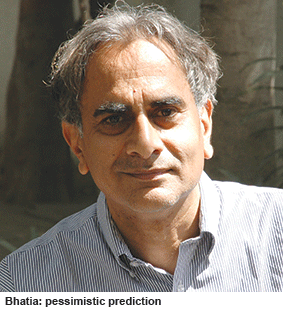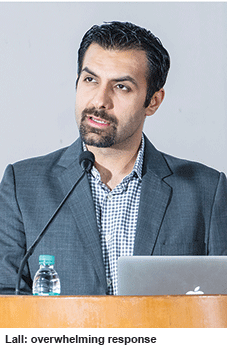In response to swelling demand, progressive education entrepreneurs (aka edupreneurs) are establishing high-quality, nationally — and in some cases globally — benchmarked schools in India’s haphazardly growing tier-II/III cities – Dilip Thakore
.gif) With India’s five largest and chronically misgoverned metros — Delhi, Mumbai, Kolkata, Chennai, Bengaluru — each of whom grudgingly hosts populations of 10 million plus, beginning to experience saturation if not rigor mortis, the action in terms of industry and business is increasingly shifting to the country’s 53 tier-II/III cities, where rising demand for well-educated youth has spurred the demand for high quality 21st century schools and higher education institutions.
With India’s five largest and chronically misgoverned metros — Delhi, Mumbai, Kolkata, Chennai, Bengaluru — each of whom grudgingly hosts populations of 10 million plus, beginning to experience saturation if not rigor mortis, the action in terms of industry and business is increasingly shifting to the country’s 53 tier-II/III cities, where rising demand for well-educated youth has spurred the demand for high quality 21st century schools and higher education institutions.
Global Initiative for Restructuring Environment & Management (GIREM), a survey conducted in 2010 by Cushman and Wakefield (rediff.com), highlights 36 tier-II/III cities on the threshold of emerging as “great modern cities” and the new centres of India’s growth story. The detailed study identifies three cities each in Kerala, Karnataka and Gujarat, four in Tamil Nadu, two each in Andhra Pradesh, Punjab and Madhya Pradesh and one in Maharashtra, Rajasthan, and Assam, among others, while providing valuable information relating to their current business and industry profiles and number of higher education institutions (see box p.48).
More recently, a Sm@rt Cities Council and Indicus Analytics study highlighted by the Indian Express (February 14, 2015) identifies 20 cities with a population of over a million as per the 2011 census (excluding the metros), which are slated to modernise subaltern India and contribute to the overall development of the nation. The report admits that while most of these cities haven’t prepared master plans, they have the opportunity to do so based on past experiences of the saturated and slowing metros. The cities that will spearhead the next few decades of economic growth, according to this report, include Surat, Nagpur, Lucknow, Vadodara, Jaipur, Pimpri-Chinchwad, Indore, Chandigarh, Gurgaon, Rajkot, Bhopal, Kanpur, Thane, Visakhapatnam, Faridabad, Kalyan, Navi Mumbai, Ghaziabad, Ludhiana and Nashik.
Even though public K-12 education in these towns of the future is characteristically in a shambles, the silver lining is that in anticipation of increasing demand, more forward-looking and progressive among India’s new tribe of education entrepreneurs (aka edupreneurs) have started establishing high-quality, nationally — and in some cases globally — benchmarked K-12 schools in tier-II/III urban habitations. Although in several new millennium landmark judgements (T.M.A Foundation vs Union of India (2002) and P.A. Inamdar vs. State of Maharashtra (2005)), the Supreme Court has acknowledged education provision as a legitimate “occupation” — even if not a business — in which private education providers are entitled to make a reasonable return on investment, it’s still commonplace within academia, media and even the judiciary, to deplore “commercialisation of education”, notwithstanding the fact that most critics of private education themselves shun government schools. Nevertheless undeterred, a growing number of edupreneurs — despite official discouragement and harassment — are promoting and establishing private schools and colleges, and are in the vanguard of the imminent boom in the growth and development of tier-II/III cities and towns.
Nor is the boom in private education surprising. Although by global — particularly China and South-east Asia — standards post-independence India’s annual average GDP growth record, in the period 1950-90 (3.5 percent per year) has been pathetic, the country’s urban middle class has swelled to over 250 million. According to India’s Urban Awakening: Building Inclusive Cities, Sustaining Economic Growth, a detailed study conducted by the McKinsey Global Institute (2010), the number of urban middle class households (defined as establishments with annual incomes of Rs.2-10 lakh per annum) will rise from 32 million in 2010 to 147 million in 2030 when the country’s urban population will aggregate 590 million with tier-II/III cities in the forefront of the expansion of middle class India. The authors of the McKinsey study estimate that the population of Hyderabad will almost double to 9.8 million in 2030, Ahmedabad to 8.4 million, Surat (7.4), Jaipur (5.4), Nagpur (5.2) and Vadodara (4.2). .gif)
However, the growth of India’s tier-II/III cities and towns is unlikely to be painless. For over a decade knowledgeable urban planners and social scientists have been sounding alarm bells about the unplanned, chaotic growth of our beleaguered cities governed by incompetent municipal corporations given minimal autonomy and strangulated by state governments ruled by corrupt and ill-educated, loot-and-scoot rural politicians. Shockingly, despite over 350 million citizens residing in the country’s estimated 7,900 towns and cities defined by haphazard planning, poor public services, reckless automotive traffic and open, uninterrupted and continuous municipal corruption, currently India has only 21,000 professionals in top urban management, of whom less than 5 percent are trained in urban practice. Another 14,000 people are in civic middle management, of whom only 20 percent are trained. The country’s premier institutions of architecture and civic planning headed by the School of Planning and Architecture, Delhi (SPA, estb.1941) and the Centre for Environment Planning and Technology University, Ahmedabad (CEPT, estb. 1962) and their half dozen clones, graduate a mere 4,000 urban planners annually.
Nor are the auguries good. Curiously, after it was promoted with a big bang in 2009 and chartered to establish a Rs.250 crore IIHS University which would produce well-educated and trained urban planners, on a 55-acre site in suburban Bangalore, the Indian Institute for Human Settlements (IIHS) which provoked a cover story in EducationWorld (August, 2011), seems to have gone under radar. Repeated telephone and e-mail messages to Aromar Revi, the shadowy director of the institute, failed to elicit any response. Moreover, the institute’s anodyne website doesn’t report any progress in the construction of IIHS University. According to informed sources the institute, a brainchild of former slapdash Union human resource development minister Kapil Sibal, and funded by the Central government, has not found favour with the new BJP government and is experiencing continuous faculty flight and a doubtful future.
 With SPA and CEPT graduating a minuscule number of town planners, most of whom anyway prefer to join civil construction and architects’ firms, it’s unsurprising that Gautam Bhatia, the well-known Delhi-based architect and writer (Silent Spaces (1995), A Short History of Everything (1997), Eternal Stone (1999) and Whitewash (2007)), is pessimistic about the planned and orderly development of urban India, including tier-II/III cities. “India’s smaller cities and towns are entirely without qualified civic and municipal administrators and are likely to repeat all the mistakes made by the country’s floundering metros. Moreover because of increasing urban consumption patterns, they are on the way to suffering serious health and sanitation problems. In education, there’s a grave shortage of trained faculty in colleges and other higher education institutions in tier-II/ III cities which is certain to create serious unemployment problems in the future,” warns Bhatia.
With SPA and CEPT graduating a minuscule number of town planners, most of whom anyway prefer to join civil construction and architects’ firms, it’s unsurprising that Gautam Bhatia, the well-known Delhi-based architect and writer (Silent Spaces (1995), A Short History of Everything (1997), Eternal Stone (1999) and Whitewash (2007)), is pessimistic about the planned and orderly development of urban India, including tier-II/III cities. “India’s smaller cities and towns are entirely without qualified civic and municipal administrators and are likely to repeat all the mistakes made by the country’s floundering metros. Moreover because of increasing urban consumption patterns, they are on the way to suffering serious health and sanitation problems. In education, there’s a grave shortage of trained faculty in colleges and other higher education institutions in tier-II/ III cities which is certain to create serious unemployment problems in the future,” warns Bhatia.
However, such doomsday predictions routinely made by sentient civic planners and intellectuals don’t seem to faze determined edupreneurs. Even if not within the country’s venal political class engaged in primitive capital accumulation, and the Indian academy isolated in ivory towers, within the ambitious 50-60 million middle class urban households there’s virtual unanimity that high quality, globally benchmarked education is the magic mantra which opens access to the great mall of material comforts — lavish homes, fancy automobiles, foreign holidays and gourmet cuisine — to which they aspire. It is also the passport to the consumer paradise and neat and clean public spaces of the developed nations of the West. Therefore middle class households are ready, willing and able to make great sacrifices to enroll their children in the rash of new-genre high-end private schools mushrooming not only in metropolitan, but small town India as well.
Promoted and driven by visionary, well-qualified and business-savvy edupreneurs cognisant of demand-supply dynamics, post-liberalisation India’s new genre of high-quality schools, especially institutions in tier-II/III cities, have the potential to deliver the demographic dividend to which the nation’s hollow politicians and society leaders routinely pay lip service. Moreover they will thoroughly prepare thousands of youth to take full advantage of higher education, and set higher teaching-learning standards for peri-urban and small town schools countrywide.
MORENA/GUNA (Madhya Pradesh)
The two Neiil World schools promoted in Morena (pop.200,000) and Guna (pop.180,000) in the hinterland of Madhya Pradesh (pop.72 million), are excellent examples of nexgen primary-secondaries sprouting in tier II/III cities countrywide. Promoted by Sourabh Garg, a Morena-based entrepreneur who runs a successful edible oils company (K.S. Oil), under the aegis of the Smt. Katori Devi Trust, the CBSE-affiliated, co-ed Neiil World School, Morena (estb.1995) sited on a five-acre campus, has an aggregate enrolment of 1,300 children mentored by 62 teachers. Equipped with “21st century infrastructure” (maths, robotics, and English language labs, ICT-enabled Tata Classedge content delivery systems in all classrooms, teacher development centre and art, dance and music studios), the school offers high-quality K-12 education at a modest Rs.40,000 per year, which nonetheless makes it the most expensive school in town. Sports and games facilities include swimming pool and basketball, tennis and badminton courts, and a 200 metres athletics track. NWS, Guna offers similar facilities to 450 students.
(pop.72 million), are excellent examples of nexgen primary-secondaries sprouting in tier II/III cities countrywide. Promoted by Sourabh Garg, a Morena-based entrepreneur who runs a successful edible oils company (K.S. Oil), under the aegis of the Smt. Katori Devi Trust, the CBSE-affiliated, co-ed Neiil World School, Morena (estb.1995) sited on a five-acre campus, has an aggregate enrolment of 1,300 children mentored by 62 teachers. Equipped with “21st century infrastructure” (maths, robotics, and English language labs, ICT-enabled Tata Classedge content delivery systems in all classrooms, teacher development centre and art, dance and music studios), the school offers high-quality K-12 education at a modest Rs.40,000 per year, which nonetheless makes it the most expensive school in town. Sports and games facilities include swimming pool and basketball, tennis and badminton courts, and a 200 metres athletics track. NWS, Guna offers similar facilities to 450 students.
“there is a huge untapped human resources pool in small-town India which needs exposure to what is possible. These towns have very few, if any schools which provide good education in the English medium. NWS, Morena was started as a philanthropic initiative by Sourabh to give back to the community. But recently, it has been upgraded and modernised to provide a world class schooling environment to enable the town’s children unlock their abundant potential. And the excellent public response in Morena prompted us to replicate it in Guna,” says Mudit Mehrotra, an electrical engineering graduate with a Masters from the Tata Institute of Social Sciences, Mumbai who began his career with Hindustan Aeronautics, Bangalore, and served as consultant with global career experts Right Management (2003-11), prior to signing up as chief operating officer of Neiil Education Pvt. Ltd in 2011.
RANCHI (Jharkhand)
 A similar aspiration motivated Rohit Sahu, an alumnus of the Sri Ram College of Commerce, Delhi and IMI, Lucerne (Switzerland) and his wife Mohita, an alumna of Lady Shri Ram College, Delhi to promote the fully-equipped Sapphire International day-cum-boarding school in Ranchi (pop. 1 million) in the newly-promulgated state of Jharkhand, carved out of Bihar in 2000. Set on a 48-acre campus, the school has 550 students mentored by 70 teachers on its muster rolls.
A similar aspiration motivated Rohit Sahu, an alumnus of the Sri Ram College of Commerce, Delhi and IMI, Lucerne (Switzerland) and his wife Mohita, an alumna of Lady Shri Ram College, Delhi to promote the fully-equipped Sapphire International day-cum-boarding school in Ranchi (pop. 1 million) in the newly-promulgated state of Jharkhand, carved out of Bihar in 2000. Set on a 48-acre campus, the school has 550 students mentored by 70 teachers on its muster rolls.
“The prime objective of Sapphire International is to provide international standard education, pastoral care and development opportunities to the children of Ranchi and Jharkhand. To this end, we are affiliated with CBSE and Edexcel, UK’s largest school examination board, to offer students the option to obtain foreign qualifications. Moreover, we have spared no pains to design a superbly equipped contemporary campus with play facilities in 16 sports including soccer, cricket, swimming, indoor squash, badminton and archery. Public response has been excellent and the school has won several national and international awards,” says promoter-chairperson Mohita Sahu. Annual tuition fees range from Rs.1.63 lakh for day scholars to Rs.3.81 lakh for boarders, high by non-metro standards, yet as testified by the school’s muster roll, parents aware of the critical importance of a sound school education in this competitive age, are prepared to pay for it.
JAMNAGAR (Gujarat)
Although critics of private education are ever ready to condemn “commercialisation of education” (while doing precious little to enable public/government schools to compete with them), they don’t seem to be aware that India’s edupreneurs, unreservedly acclaimed by Dr. James Tooley, professor of education at Newcastle-upon-Tyne University (UK) in his excellent but ignored book The Beautiful Tree (2009), are stepping in to educate children from aspirational slum and poor households, at all price points. Jamnagar-based Ekta Sodha, who has a Masters in education, international leadership and management from Newcastle University and inherited two K-12 schools, is focused on delivering contemporary education at rock-bottom prices. Tuition fees in the five Sodha Group of K-X schools which have an aggregate enrolment of 4,000 students, range between Rs.400-600 per month. At these price points the Sodha schools offer “a unique pedagogy based on technology and high-quality assessment programmes” which enable students to record consistent improvement in learning outcomes.
acclaimed by Dr. James Tooley, professor of education at Newcastle-upon-Tyne University (UK) in his excellent but ignored book The Beautiful Tree (2009), are stepping in to educate children from aspirational slum and poor households, at all price points. Jamnagar-based Ekta Sodha, who has a Masters in education, international leadership and management from Newcastle University and inherited two K-12 schools, is focused on delivering contemporary education at rock-bottom prices. Tuition fees in the five Sodha Group of K-X schools which have an aggregate enrolment of 4,000 students, range between Rs.400-600 per month. At these price points the Sodha schools offer “a unique pedagogy based on technology and high-quality assessment programmes” which enable students to record consistent improvement in learning outcomes.
“Our prime focus is on keeping costs, and therefore tuition fees low at all times, while simultaneously building a strong culture of customer service and customer relationship management. The public response to our schools, some of which provide English-medium education and others in which there is heavy emphasis on teaching English, has been overwhelming and we are struggling to accommodate the huge demand for admissions,” says Sodha.
NASHIK/TRICHY/AURANGABAD
 Pressing demand for English-medium and new technologies-driven school education from tier-II/III cities which indifferent governments don’t care to meet, has not only prompted public-spirited local entrepreneurs to promote privately-funded schools and colleges, but also metropolitan edupreneurs fully engaged in the occupation of education provision.
Pressing demand for English-medium and new technologies-driven school education from tier-II/III cities which indifferent governments don’t care to meet, has not only prompted public-spirited local entrepreneurs to promote privately-funded schools and colleges, but also metropolitan edupreneurs fully engaged in the occupation of education provision.
A case in point is young Mumbai-based edupreneur Jesus Lall, director and chief executive of the Mumbai-based Universal Group, which has promoted and/or operates three highly-ICT enabled (a distinguishing characteristic of the Universal Group) K-12 schools in Nashik (Maharashtra), three in Tirucharapalli (aka Trichy), and one in Aurangabad which currently have an aggregate enrolment of 10,000 children.
“There’s a conspicuous dearth of new generation schools offering contemporary curriculums and pedagogies in most tier-II cities, where students are still subjected to rote learning. Therefore our balanced technology-driven curriculum — every student is provided a tablet aided digitalised curriculum — is comparable to the best national and international practices which develop a variety of learning and life skills, including research, problem solving, creative thinking, and teamwork. The bottomline is that we have received overwhelming response to our schools in these cities. Parents are highly appreciative of the innovative ways their children are learning in our schools,” says Lall.
JODHPUR (Rajasthan)
In the desert scrublands of Rajasthan, while Jaipur, the administrative capital, boasts several schools which are in the Top 30 nationally of the annual EducationWorld India School Rankings, and Ajmer hosts the vintage Mayo College, the outlier city of Jodhpur (pop. 1.7 million) is not as well served. This consideration prompted Naresh Bothra, who runs a successful handicrafts and furniture business, to promote the mint new globally benchmarked Bodhi International School (BIS) — “designed as a school for future citizens, offering the highest reaches of new technologies and latest pedagogies” — in this tier-III city.
Jodhpur (pop. 1.7 million) is not as well served. This consideration prompted Naresh Bothra, who runs a successful handicrafts and furniture business, to promote the mint new globally benchmarked Bodhi International School (BIS) — “designed as a school for future citizens, offering the highest reaches of new technologies and latest pedagogies” — in this tier-III city.
Sited on a 6.5-acre campus in Jodhpur, BIS offers its first batch of 320 students mentored by 30 teachers fully wired classrooms, world-class IT, maths and language labs, the Mahesh Bhupathi Tennis Academy Programme on its two all-weather synthetic tennis courts, the soccer and fitness programme of the Mumbai-based The Sports Gurukul, the robotics learning programmes of Lego Education, Denmark and the enhanced learning programme of the Palo Alto (USA)-based Looking Glass organisation. Tuition fees: Rs.71,000-135,000 per year.
“The prime objective of BIS is to fully develop the intellectual capabilities and creative potential of students by generating love of learning and connecting classroom knowledge with the outside world. This was the inspiration given to us by our mentor Gurudev Kamal Vijayji who directed us to provide the gift of modern education in a scalable format. Public response to this initiative has been excellent and within less than a year, we have been able to position BIS as a genuinely international school which has attracted the planned target of 320 students in the first phase of development,” says Bothra.
VARANASI (Uttar Pradesh)
.gif) Even in the benighted state of UP — India’s most populous (200 million) and anarchic Hindi heartland — where school education is caught in a continuous downward spiral, public-spirited edupreneurs are stepping into the breach. A case in point are the Varanasi-based Deepak and Bharati Madhok who have multiplied the single school promoted by his educator parents in the sacred city of Varanasi in 1972, to six CBSE-affiliated English-medium K-12 institutions currently. Moreover, the Sunbeam Group also includes 14 franchised/partner CBSE-affiliated English-medium day and day-cum-boarding schools with 24,000 students and 2,500 teachers in tier III cities and towns of eastern UP — Mughalsarai, Jaunpur, Ghazipur, Mau, Deoria, Bhadhoi, Faizabad, Ballia, Sultanpur, Robertsganj, Azamgarh, Mirzapur and Cholapur.
Even in the benighted state of UP — India’s most populous (200 million) and anarchic Hindi heartland — where school education is caught in a continuous downward spiral, public-spirited edupreneurs are stepping into the breach. A case in point are the Varanasi-based Deepak and Bharati Madhok who have multiplied the single school promoted by his educator parents in the sacred city of Varanasi in 1972, to six CBSE-affiliated English-medium K-12 institutions currently. Moreover, the Sunbeam Group also includes 14 franchised/partner CBSE-affiliated English-medium day and day-cum-boarding schools with 24,000 students and 2,500 teachers in tier III cities and towns of eastern UP — Mughalsarai, Jaunpur, Ghazipur, Mau, Deoria, Bhadhoi, Faizabad, Ballia, Sultanpur, Robertsganj, Azamgarh, Mirzapur and Cholapur.
“In their own small way, the Sunbeam schools have revolutionised K-12 schooling in the educationally under-served cities and towns of Uttar Pradesh to whom we have reached out. The feedback we’ve received from parents and students has been very positive, and we routinely receive letters from far flung communities inviting us to establish Sunbeam schools. While this is a great feeling, it also places high responsibility upon us to deliver quality education as per their expectations,” says Deepak, a biochemistry postgraduate of Allahabad University and former UP cadre civil service officer, who quit in 1977 and (together with wife Bharati) has engineered the growth and development of the Sunbeam Group of education institutions which currently number 12, and also include the Sunbeam Women’s College, Bhagwanpur (estb. 2002) and the Gramin School, Karsana, a free-of-charge school providing vocational training to rural underprivileged children.
BHUBANESWAR (Odisha)
Similar intelligent crystal-ball gazing prompted former Bhubaneswar chartered and cost accountant Bijoy Sahoo to transform into an education entrepreneur and promote the globally-benchmarked Sai International day-cum-boarding school, Bhubaneswar (pop.2 million) in 2008, after a decade-long recce of top-ranked schools in the US, UK and Europe. Within a quinquennium, the CBSE-affiliated, English-medium Sai International with an enrolment of 3,500 students including 500 boarders, has established a national reputation. In the EW India School Rankings, it was among the country’s Top 10 day-cum-boarding schools and # 1 in the state of Odisha (pop.43 million). Moreover in April this year, Sai Angan, described as India’s largest crèche-cum-pre-primary (1.5 lakh sq.ft), with a curriculum based entirely on the Multiple Intelligences theory propounded by Dr. Howard Gardner of the Harvard School of Education, advertised for 700 children in the age group 2.5-7 years. Following overwhelming response, Sai Angan was obliged to admit 800 toddlers.
Bhubaneswar (pop.2 million) in 2008, after a decade-long recce of top-ranked schools in the US, UK and Europe. Within a quinquennium, the CBSE-affiliated, English-medium Sai International with an enrolment of 3,500 students including 500 boarders, has established a national reputation. In the EW India School Rankings, it was among the country’s Top 10 day-cum-boarding schools and # 1 in the state of Odisha (pop.43 million). Moreover in April this year, Sai Angan, described as India’s largest crèche-cum-pre-primary (1.5 lakh sq.ft), with a curriculum based entirely on the Multiple Intelligences theory propounded by Dr. Howard Gardner of the Harvard School of Education, advertised for 700 children in the age group 2.5-7 years. Following overwhelming response, Sai Angan was obliged to admit 800 toddlers.
“A large number of IT multinationals have established back offices in Bhubaneswar. Therefore, a pressing demand for comprehensive, internationally benchmarked primary-secondary schools was inevitable. Indeed so great is the demand in Sai International that we receive over 6,000 applications against our 700 annual vacancies. This has forced us to introduce our own entrance examination. The premium on the multiple intelligences-based Sai Angan has been high right from the start and we expect to attain our full capacity of 1,500 children next year,” says Sahoo.
VIDARBHA (Maharashtra)
Intelligent environment scanning and demand forecasting capability is the secret of success of the Nagpur-based Meghe Group of seven pre-primaries, eight state board and eight CBSE schools, which over the past 12 years have provided an education lifeline to the people of the neglected, drought-prone Vidarbha region of Mahara.gif) shtra whose 23 million people have been unsuccessfully demanding separate statehood for several decades.
shtra whose 23 million people have been unsuccessfully demanding separate statehood for several decades.
According to Abha Meghe, a food and nutrition and education alumna of Nagpur University and currently director of Meghe Group, until 2003 there were no English-medium CBSE schools in Vidarbha other than in Nagpur, when the group established its first CBSE K-12 schools in Amravati, Akola, Wardha, Yavatmal and Gadchiroli. Since then, because of public demand the group’s schools in Vidarbha have increased to 23 with an aggregate enrolment of 22,000 students mentored by 900 teachers.
“The response of the people of Vidarbha to our English-medium CBSE and state board education delivered by well-trained teachers has been very encouraging. Most of our schools offer students e-learning opportunities and ICT-enabled classrooms. We are gradually changing the mindset of parents who are beginning to regard quality education as an investment in the future of their children, rather than a variable household expense,” says Meghe.
KOZHIKODE (Kerala)
A similar strategy of discerning unarticulated demand and moving towards fulfilling it, was adopted by a consortium of successful Gulf-based entrepreneurs to confer the Sadhbhavana World School (SWS) on the people of the tier-III town (pop. 2.gif) million) of Kozhikode (formerly Calicut), Kerala in 2008. Since then despite initial opposition from the state’s levelling-down communists who dubbed it elitist, SWS which is sited on a 28 acre green campus, has attracted 550 students and 65 teachers. In the latest EW India School Rankings 2014, SWS is ranked among the country’s Top 10 international day schools and #1 in Kerala.
million) of Kozhikode (formerly Calicut), Kerala in 2008. Since then despite initial opposition from the state’s levelling-down communists who dubbed it elitist, SWS which is sited on a 28 acre green campus, has attracted 550 students and 65 teachers. In the latest EW India School Rankings 2014, SWS is ranked among the country’s Top 10 international day schools and #1 in Kerala.
“SWS also has a well-designed community outreach programme and is involved in various philanthropic activities, with the result the media and general public have been very supportive of the school. I believe that by successfully establishing SWS as a nationally Top 10 ranked school, we have been able to change the thinking of people in Kerala about the vital importance of K-12 education as a stepping stone to fulfilling higher education and careers,” says Harish K.E, chief executive of the Sadhbhavana Group, a company founded by several Dubai and UAE-based emigrants from Kerala.
Leftist demonology, to which it is pertinent to note Mahatma Gandhi never subscribed, paints all private education providers as exploitative capitalists engaged in the commercialisation of education. Yet the ground reality is that the great majority of them have ventured into the red-tape ensnarled education sector in the spirit of contributing to hapless communities dependent upon the small mercies of dysfunctional, obsolete government school systems.
BHAVNAGAR (Gujarat)
 Certainly these were factors which prompted British-born Renu McLachlan, an alumna of University of Central England and former UK-based publishing executive and her husband Paul (an IT consultant) to take charge of the Amar Jyoti Saraswati International (ASIS) and Silver Bells schools in Bhavnagar (pop. 500,000), Gujarat, promoted by Renu’s mother Amarjyoti Gohil, founder-trustee of the two schools. Currently the CISCE-affiliated K-12, co-ed ASIS (estb. 2000) equipped with thoroughly modern infrastructure (wifi-enabled campus, three computer labs with LAN, fully-wired classrooms, separate biology, physics, chemistry labs, football, cricket, tennis facilities), has 1,400 students mentored by 90 teachers on its muster roll.
Certainly these were factors which prompted British-born Renu McLachlan, an alumna of University of Central England and former UK-based publishing executive and her husband Paul (an IT consultant) to take charge of the Amar Jyoti Saraswati International (ASIS) and Silver Bells schools in Bhavnagar (pop. 500,000), Gujarat, promoted by Renu’s mother Amarjyoti Gohil, founder-trustee of the two schools. Currently the CISCE-affiliated K-12, co-ed ASIS (estb. 2000) equipped with thoroughly modern infrastructure (wifi-enabled campus, three computer labs with LAN, fully-wired classrooms, separate biology, physics, chemistry labs, football, cricket, tennis facilities), has 1,400 students mentored by 90 teachers on its muster roll.
Likewise, the CBSE, K-12 co-ed Silver Bells (estb.1993) which provides equally impressive academic infrastructure and co-curricular and sports facilities, has 1,900 students and 105 teachers on its rolls. In both schools, English is taught rigorously, often by foreign visiting faculty. Unsurprisingly, in the latest EW India School Rankings 2014, ASIS was ranked #6 in Gujarat and #1 in Bhavnagar in the day schools category.
“My mother founded these schools many years ago. I was born and studied in England, but would regularly visit during school holidays. For almost 20 years, as I watched the schools and the town grow, it captured a part of my heart and became part of me.
When it all began, there was just a very small building, which was literally surrounded by jungle. Before we married, my husband Paul visited several times and worked on a voluntary basis, and the school also found a special place in his heart. Over the years as the campuses grew bigger and houses developed around the schools, they became the centre of a whole new area, creating employment for hundreds of people, while giving an amazing start in life to many children. At the moment, there’s still some confusion about the value of spoken English, as also CISCE certification, but there’s growing appreciation of the value of globally comparable education,” says Renu McLachlan.
With India’s ill-governed, chaotic metros bursting at the seams with unprecedented vehicular gridlock, air pollution, garbage mountains and sanitation problems, the onus of maintaining the economy’s 7 percent plus GDP growth momentum has devolved upon the country’s tier-II/III cities. The auguries are not good, because archaic municipal governance systems countrywide seem beyond the reformist capabilities of the political class, academia and the lotus-eating intelligentsia.
Nevertheless, the silver lining is that thanks to the country’s newly-emergent tribe of education entrepreneurs, quality schools and colleges have struck roots in small-town India, offering the prospect of thousands of well-educated youth with high order thinking and problem-solving skills boosting their economies and improving local government.
The public interest demands that the Central and state governments encourage private initiatives in K-12 and higher education not only to develop the human resources required by industry, but to also set standards and benchmarks for government and private schools in their neighbourhoods. That’s the formula for the greater good of the greatest number.
Also read: Bright Diamond Schools of Small Town India























